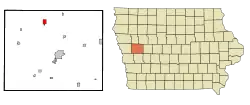Schleswig, Iowa
Schleswig is a city in Crawford County, Iowa, United States. The population was 882 at the 2010 census.
Schleswig, Iowa | |
|---|---|
 Location of Schleswig, Iowa | |
| Coordinates: 42°9′49″N 95°26′6″W | |
| Country | |
| State | |
| County | Crawford |
| Area | |
| • Total | 1.31 sq mi (3.39 km2) |
| • Land | 1.30 sq mi (3.36 km2) |
| • Water | 0.01 sq mi (0.03 km2) |
| Elevation | 1,503 ft (458 m) |
| Population | |
| • Total | 882 |
| • Estimate (2019)[3] | 857 |
| • Density | 660.25/sq mi (254.93/km2) |
| Time zone | UTC-6 (Central (CST)) |
| • Summer (DST) | UTC-5 (CDT) |
| ZIP code | 51461 |
| Area code(s) | 712 |
| FIPS code | 19-71130 |
| GNIS feature ID | 0461464 |
History
Schleswig was laid out in 1899.[4] The city was named after the Schleswig in Germany and Denmark, from which the original settlers came.[4]
Geography
Schleswig is located at 42°9′49″N 95°26′6″W (42.163614, -95.434944).[5]
According to the United States Census Bureau, the city has a total area of 1.31 square miles (3.39 km2), of which 1.30 square miles (3.37 km2) is land and 0.01 square miles (0.03 km2) is water.[6]
Demographics
| Year | Pop. | ±% |
|---|---|---|
| 1900 | 233 | — |
| 1910 | 455 | +95.3% |
| 1920 | 655 | +44.0% |
| 1930 | 638 | −2.6% |
| 1940 | 628 | −1.6% |
| 1950 | 751 | +19.6% |
| 1960 | 785 | +4.5% |
| 1970 | 875 | +11.5% |
| 1980 | 868 | −0.8% |
| 1990 | 851 | −2.0% |
| 2000 | 833 | −2.1% |
| 2010 | 882 | +5.9% |
| 2019 | 857 | −2.8% |
| Source:"U.S. Census website". United States Census Bureau. Retrieved 2020-03-28. and Iowa Data Center Source: | ||
2010 census
As of the census[2] of 2010, there were 882 people, 377 households, and 246 families living in the city. The population density was 678.5 inhabitants per square mile (262.0/km2). There were 419 housing units at an average density of 322.3 per square mile (124.4/km2). The racial makeup of the city was 92.9% White, 0.6% African American, 0.1% Asian, 0.1% Pacific Islander, 4.4% from other races, and 1.9% from two or more races. Hispanic or Latino of any race were 6.9% of the population.
There were 377 households, of which 28.9% had children under the age of 18 living with them, 53.6% were married couples living together, 7.2% had a female householder with no husband present, 4.5% had a male householder with no wife present, and 34.7% were non-families. 29.4% of all households were made up of individuals, and 15.4% had someone living alone who was 65 years of age or older. The average household size was 2.34 and the average family size was 2.89.
The median age in the city was 43.8 years. 25.3% of residents were under the age of 18; 5.4% were between the ages of 18 and 24; 20.4% were from 25 to 44; 27.9% were from 45 to 64; and 21% were 65 years of age or older. The gender makeup of the city was 48.0% male and 52.0% female.
2000 census
As of the census[8] of 2000, there were 833 people, 368 households, and 248 families living in the city. The population density was 633.5 people per square mile (245.5/km2). There were 411 housing units at an average density of 312.6 per square mile (121.1/km2). The racial makeup of the city was 99.76% White, 0.12% Asian, and 0.12% from two or more races. Hispanic or Latino of any race were 1.08% of the population.
There were 368 households, out of which 25.0% had children under the age of 18 living with them, 58.7% were married couples living together, 6.0% had a female householder with no husband present, and 32.6% were non-families. 31.5% of all households were made up of individuals, and 22.0% had someone living alone who was 65 years of age or older. The average household size was 2.26 and the average family size was 2.79.
In the city, the population was spread out, with 23.6% under the age of 18, 3.7% from 18 to 24, 23.0% from 25 to 44, 21.4% from 45 to 64, and 28.2% who were 65 years of age or older. The median age was 45 years. For every 100 females, there were 96.9 males. For every 100 females age 18 and over, there were 88.7 males.
The median income for a household in the city was $31,328, and the median income for a family was $39,000. Males had a median income of $30,429 versus $17,438 for females. The per capita income for the city was $15,805. About 3.3% of families and 4.2% of the population were below the poverty line, including none of those under age 18 and 3.5% of those age 65 or over.
References
- "2019 U.S. Gazetteer Files". United States Census Bureau. Retrieved July 17, 2020.
- "U.S. Census website". United States Census Bureau. Retrieved 2012-05-11.
- "Population and Housing Unit Estimates". United States Census Bureau. May 24, 2020. Retrieved May 27, 2020.
- Chicago and North Western Railway Company (1908). A History of the Origin of the Place Names Connected with the Chicago & North Western and Chicago, St. Paul, Minneapolis & Omaha Railways. p. 123.
- "US Gazetteer files: 2010, 2000, and 1990". United States Census Bureau. 2011-02-12. Retrieved 2011-04-23.
- "US Gazetteer files 2010". United States Census Bureau. Archived from the original on 2012-01-25. Retrieved 2012-05-11.
- "Census of Population and Housing". Census.gov. Retrieved June 4, 2015.
- "U.S. Census website". United States Census Bureau. Retrieved 2008-01-31.